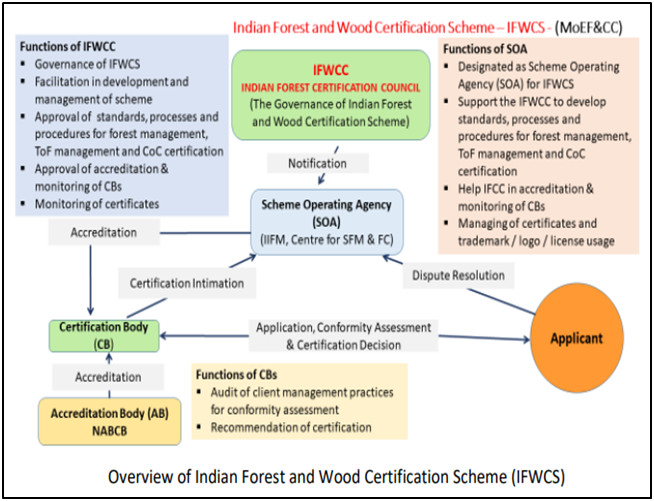Why in News?
- Amid rising international concerns on deforestation and illicit trade in timber, the Government of India has launched its own national forest certification scheme - The Indian Forest and Wood Certification Scheme (IFWCS).
- The IFWCS will validate entities that adhere to sustainable practices in management of forests and its products.
What’s in Today’s Article?
- What is the IFWCS?
- How are Forests in India Managed?
- Need for the IFWCS
- Significance of the IFWCS
What is the IFWCS?

- IFWCS would offer -
- Certification for sustainable forest management,
- Sustainable management of trees outside forests like those in plantations, and
- Chain of custody which is a sort of guarantee of the traceability of a forest product throughout its supply chain, from the origins to the market.
- Certification may be of use to -
- Forest management units,
- Corporations, or wood-based industries,
- Tree growers, timber or NTFP (Non-Timber Forest Produce) traders,
- Saw millers, exporters or importers of wood-based and NTFP-based products, and
- Other end-user industries.
How are Forests in India Managed?
- Forests in India are managed according to their respective working plans.
- These working plans have now been updated with the newly-developed Indian Forest Management Standards that contain 8 criteria, 69 indicators and 254 verifiers.
- These standards will be mandatory for all forest divisions in the country to implement.
- However, getting the certification is not mandatory for the forest divisions, even though they would become eligible if they adhere to these standards.
- Obtaining the certification would depend on needs.
Need for the IFWCS:
- A global investigation into deforestation by the International Consortium of Investigative Journalists (ICIJ) had revealed that there were serious questions over the integrity of forest certifications.
- This has affected acceptance of Indian products in international markets and resulted in high dropout rates among certified entities.
- Europe and the US happen to be the largest export markets for India’s forest-based products, particularly handicraft and furniture.
- These markets have been tightening the rules for import of forest products because of greater sensitivity around deforestation on climate change concerns.
- At the Glasgow climate change conference in 2021, over 100 countries had come together in a pledge to halt, and reverse, deforestation by 2030.
- Hence, the Government of India was planning to start its own certification scheme for improved regulation of the market.
Significance of the IFWCS:
- It will offer an alternative to the private foreign certification agencies that have been operating in the Indian market for the last two decades.
- It will bring greater trust and transparency into the processes, and grant greater acceptability to Indian forest-based products in international markets.
- Right now, it is a government-initiated and government-backed scheme, but eventually it is likely to evolve into an independent entity like the Bureau of Indian Standards (BIS) or Quality Council of India (QCI).









